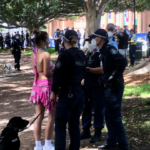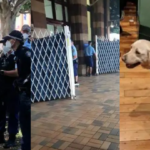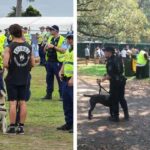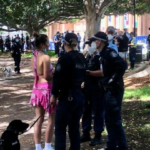Strip Search Class Action Confirms Numerous NSW Police Strip Searches Illegal
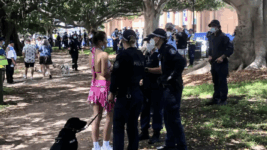
NSW Court of Appeal Justice Dina Yehia awarded strip search class action lead plaintiff Raya Meredith $93,000 on Tuesday, while lawyers estimate her more than 3,000 co-plaintiffs could be awarded “potentially millions”, which will be the final outcome of a case that was the product of the NSW police shift towards excessively strip searching the public at ever-increasing rates in the late 2010s.
Run by the Redfern Legal Centre and law firm Slater and Gordon, the strip search case was the largest class action ever run against an Australian police force, and it served to draw attention to the situation that involved, as Slater and Gordon associate William Zerno put it, the “industrial scale” strip searching of young people at festivals late last decade, with many subjects merely teens.
Justice Yehia is yet to release her findings or make the final determinations on damages and costings, but she was clear on delivering the outcome for Meredith on 30 September 2025, that there was a lack of training, education and supervision provided to the armed NSW police officers who were charged with ordering civilians to strip down in front of them on the off-chance they’d find drugs.
Zerno added that the likely outcome of the ruling will be that thousands of past strip searches that were the subject of the case – those occurring at festivals from 2016 to time of case lodgement the 21 July 2022 – will now be rendered illegal. Some of the worst cases Sydney Criminal Lawyers recalls involved officers touching teen genitals and young people made to partially disrobe in public.
The successful outcome to the strip search class action, while not unexpected, does provide the opportunity for NSW to bring this “shameful episode” to a close. However, the understanding is that after the brief hiatus to the NSW police mass strip search initiative was brought to an end by the COVID pandemic, it’s understood NSW police are back to degrading and traumatising civilians.
A victory for those wronged
“The courage of young people has driven this action,” said Redfern Legal Centre police accountability supervising solicitor Samatha Lee, who’s been a key advocate against the free-for-all that has been the NSW police mass strip search initiative. “When no government stood up for them, they stood up for themselves. When no government took care of them, they took care of themselves.”
“The case sends a clear message to NSW police – hands off young people and children’s bodies,” the legal professional continued. “You can no longer ask a young person to take off all their clothes, stand naked in front of strangers with firearms and make them squat and cough on the suspicion of minor drug possession.”
So widespread were complaints and stories about police on the street and at music festivals carrying out illegal strip searches that the Law Enforcement Conduct Commission (LECC) launched an inquiry into the matter in late 2018, with accounts in reports revealing numerous suspect strip searches of teens at festivals. So thorough was the inquiry the suggestion was the LECC head was fired over it.
Prior to filing the class action in 2022, Redfern Legal Centre had launched the Safe and Sound campaign in relation to strip searches at festivals, which had the aim of seeing the “vague and legalistic” wording of strip search protocols set out in the legislation upgraded, and it went on to commission the production of the UNSW Rethinking Strip Searches by NSW Police report.
“This action does not right the wrongs. This action does not remove trauma. This action does not restore the dignity that was taken from young people,” Lee underscored. “What this decision does is provide a path to monetary compensation and a sense of justice to thousands of young people, children and adults who were unlawfully strip-searched.”
“It acknowledges that what happened to them was wrong.”

Get sniffed
Alongside Lee, another key campaigner against the unbridled use of strip searches over the last ten years has been former NSW Greens MLC and current Greens Senator David Shoebridge, who, along with the NSW Young Greens, launched the Sniff Off campaign against the rising, and currently ongoing issue, of police running drug dogs through public places without a warrant.
The NSW drug dog unit started operating on Gadigal land in Sydney, after the canines were brought in for the 2000 Sydney Olympics. The drug dogs started turning up at train stations, as well as being walked through pubs, after the laws governing them took effect in 2002. However, after the 2006 Ombudsman report into the dogs, it was clear they were a highly flawed law enforcement method.
The Ombudsman found that only 26 percent of searches by police following a drug dog indication resulted in any illicit substances being located and when this happened the overwhelming majority of searches only turned up a small amount of cannabis. Shoebridge repeatedly sought the annual statistics relating to these procedures, which remained consistent with the Ombudsman’s findings.
The campaign against an apparent rise in strip searches commenced mid-last decade, as it came to light that NSW police officers were often following a drug dog indication that a subsequent pat down search turned up nothing, with a strip search that involves a civilian having to remove all of their clothes in front of two armed officers solely to see if they might have illegal drugs on them.
Not only were and are NSW police getting members of the public, some as young as 10, to strip off in front of them, which is understood to be traumatising in itself, along with retraumatising to past victims of sexual assault, but many anecdotes revealed officers who had no clue about protocols, failing to follow them and hence, breaking the rules and further degrading those ordered to strip off.
A traumatising night on the town
“As a patron of many music festivals, Splendour in the Grass 2018 has stuck with me and probably always will, due to the inhumane treatment of the NSW police towards myself,” said chief plaintiff Meredith in the wake of Tuesday’s ruling. “And I am but one of many whose unfortunate experience at the hands of NSW law enforcement will haunt.”
“I can say with absolute honesty that I am glad it’s over,” the woman, who had just been awarded $93,000 in damages added. “It’s been harrowing and traumatising, yet at the same time I am incredibly proud of myself and my bravery, and the bravery of those whose voices back my own with their stories and experiences.”
Meredith’s strip search took place at the 2018 Splendour in the Grass festival, which is held on Bundjalung Country at the North Byron Parklands in Yelgun. The search of the 27-year-old involved multiple breaches of protocols, and it included her being asked to remove her tampon, and a male officer happened to stroll into the search tent whilst the strip search was underway.
The commencement of the long-anticipated strip search class action was marked by an unexpected admission from the NSW Police Force on 2 April, that involved admitting Meredith’s strip search was indeed illegal. This recognition so close to trial commencement caused initial confusion, but a lawyer for Meredith confirmed she’d still be asserting false imprisonment and assault in court.
“Speaking up against authority figures takes guts. After all, change was never made by those who stayed silent,” Meredith said in concluding. “I sincerely hope that this case brings an end to the practice of unlawful strip searches, and in the future police powers are only used in the circumstances intended by parliament.”


